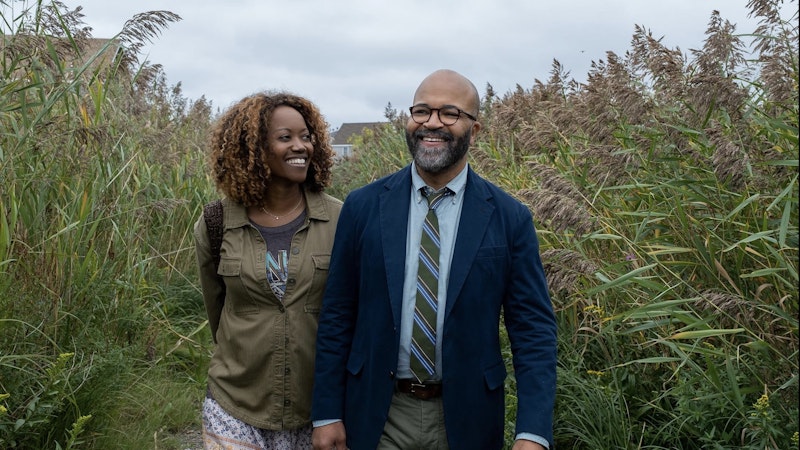Thelonious Ellison, nicknamed “Monk” by friends and family, is a novelist and literature professor, and American Fiction begins the day he’s cancelled at work. Ellison (Westworld’s Jeffrey Wright) has discomfited his mainly white progressive students by giving a lecture on Flannery O’Connor’s short story “The Artificial Nigger.” A white college girl files a complaint against her African-American professor that his writing the n-word on a white board makes her uncomfortable.
O’Connor’s story is about the frictions between an impoverished, rural white man who takes his grandson to Atlanta, in part so the boy can see his first Negro. They become lost, walking through a commercial district, then a poor black neighborhood, and then a posh white suburb. In the latter they see no black people except a plaster statue, and the grandfather remarks, “They ain’t got enough real ones here. They got to have an artificial one.”
Monk, let go from the university, has no money from his writing, since his complex, nuanced novels are critically acclaimed but not best sellers. The timing’s bad. He’s the black sheep in his upper-middle class family where his father, his brother and his sister are all medical doctors. But his father has already died, and after we briefly meet his sister (Tracie Ellis Ross), she dies. His brother (Sterling K. Brown) is financially wiped out by divorce after his wife catches him in bed with a man, and then descends into a belated gay adolescence of cocaine, booze, and more (lots more) men. The timing’s bad because at this point Monk’s mom (Leslie Uggams) descends into senility. The best care facility he can find is over $5000 a month for a shared room and almost $7000 for a private one. When Monk asks his brother to chip in, the reply is “Why does she need the best place? She wasn’t the best mother.”
Off work, trying to keep mom from wandering lost down the beach at their family home, Monk sees a much more successful author on TV, Sintara Golden (Issa Rae), whose new gritty novel about ghetto life makes her a toast of society. Monk’s steamed, believing these popular odes to victimology are new “artificial niggers” for progressives who no longer know any black people (especially black people not of the same class), except for the Amazon delivery man they see through their Ring doorbell, self-checkout kiosks and Roomba and Salvadoreans having replaced the black people their parents knew. Growing angry while speaking with his agent Arthur (John Ortiz) about whether anyone’s going to buy his newest novel, he hatches the idea for a practical joke: a ghetto novel so crude the publishing industry will be chastened when they read the manuscript.
His nom de plume is Stagg Leigh—Stan Lee?—and he adopts a thug voice and back story for conference calls, and claims he can’t be shown on TV because he’s an ex-con and a fugitive from the FBI. And so is born My Pathology, which then becomes My Pafology. When a publishing house offers him a $750,000 advance, he ups the heat in his joke and insists the title be changed to Fuck. Fuck becomes a bestseller, and an oily Adam Brody plays a Hollywood producer who wants to pay Monk $4 million for the movie rights.
While this is happening to his alter ego, Monk’s appointed to a panel of judges for a national book award for novels by minorities, because the white liberals running the awards realize most of their judges are white. And so Monk ends up on a panel with three whites judges and… Sintara Golden. At one point the film has a few minutes of Platonic dialogue on the vices of sophistry between Monk and Golden, with Monk criticizing not just white progressives who need their artificial niggers, but black progressives like Golden who serve them up, like drug pushers. Golden takes a libertarian capitalist position: she says she thinks drugs should be legal and asks why only a black woman shouldn’t be free to make a living selling the market what it demands. Monk says he sees so much more potential in black people than is shown in pop culture and Golden replies: “Potential is what people see when what's in front of them isn't good enough.” It’s something of a stand-off.
I’m assuming American Fiction, based on the novel Erasure by Percival Everett is slightly autobiographical. Everett’s a UCLA literature professor who’s written over 20 novels along with poetry and a children’s book. “I’ve been called a Southern writer, a Western writer, an experimental writer, a mystery writer, and I find it all kind of silly,” Everett told The New Yorker. “If I can make you believe it, then it’s fair game.” I’ve only read his short story “The Appropriation of Cultures,” in which another black man of means, an Ivy-educated trust fund kid, adopts the song Dixieland and the Confederate flag as black power symbols so effectively that everyone else stops using them.
American Fiction goes into wide release in January. This movie was refreshing in two ways. First, it may be the best and most thoughtful movie out this year, though there’s a paucity of competition. Second, it’s a movie highlighting talented black actors (and a screenwriter) that isn’t a Netflix colorization in which Snow White or Odin are cast with a black actor. Everett has over 20 other novels, and there are other great stories by black authors, from Octavia Butler to Walter Mosley. Why aren’t they movies?

